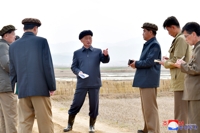Military secret sharing deal crucial to Northeast Asia peace: U.S. official
WASHINGTON, Dec. 22 (Yonhap) -- Greater sharing of military intelligence between the United States, South Korea and Japan is crucial to peace and stability in Northeast Asia, a U.S. government official said amid reports that just such a deal is imminent.
Officials of the three countries have held discussions on concluding a possible memorandum of understanding to improve military secret sharing after their defense ministers held trilateral talks in Singapore in May and agreed on the need for such an agreement.
Last week, media reports in South Korea and Japan said that the three countries have entered the final stage of discussions on the issue and a deal could be signed before the end of the year.
"We have been very consistent and very clear that we view improved information sharing between the United States, Japan and the Republic of Korea as being a very important priority focus," a U.S. government official said on condition of anonymity.
"We view this type of interactions being crucial to helping to maintain deterrence and peace and stability in Northeast Asia. So we have been looking at ways to strengthen and improve our information sharing relationship," the official said.
The official declined to discuss the recent press reports, but added it is "no surprise that we're interested in looking at ways to strengthen information sharing because this has been a consistent priority for us for a long time."
South Korea and the U.S. have a bilateral military intelligence sharing agreement and so do the U.S. and Japan. Seoul and Tokyo had worked to sign such an agreement in 2012, but a deal fell apart at the last minute due in part to negative public sentiment in South Korea about signing such a pact with the former colonial ruler.
Critics of a three-way information sharing deal between the U.S., South Korea and Japan have claimed that the envisioned agreement is an attempt to get around public opposition in South Korea to having such a deal with Japan.
Japan ruled the Korean Peninsula as a colony from 1910-45, and resentment of the country's atrocities during the colonial rule, such as sexual enslavement of Korean women for its troops, still runs deep among many South Koreans.
jschang@yna.co.kr
(END)
-
 Defense chief says N. Korea's hypersonic missile 'unsuccessful' in last-stage glide flight
Defense chief says N. Korea's hypersonic missile 'unsuccessful' in last-stage glide flight -
 Relax, immerse yourself in scents at Venice Biennale's Korean Pavilion
Relax, immerse yourself in scents at Venice Biennale's Korean Pavilion -
 Overdue debut of Korean abstract art pioneer Yoo Young-kuk at Venice Biennale
Overdue debut of Korean abstract art pioneer Yoo Young-kuk at Venice Biennale -
 N. Korea has capability to genetically engineer biological military products: U.S. report
N. Korea has capability to genetically engineer biological military products: U.S. report -
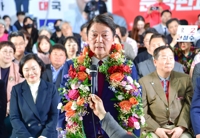 PPP lawmaker says entire Cabinet should resign over general elections defeat
PPP lawmaker says entire Cabinet should resign over general elections defeat
-
 Relax, immerse yourself in scents at Venice Biennale's Korean Pavilion
Relax, immerse yourself in scents at Venice Biennale's Korean Pavilion -
 Overdue debut of Korean abstract art pioneer Yoo Young-kuk at Venice Biennale
Overdue debut of Korean abstract art pioneer Yoo Young-kuk at Venice Biennale -
 Defense chief says N. Korea's hypersonic missile 'unsuccessful' in last-stage glide flight
Defense chief says N. Korea's hypersonic missile 'unsuccessful' in last-stage glide flight -
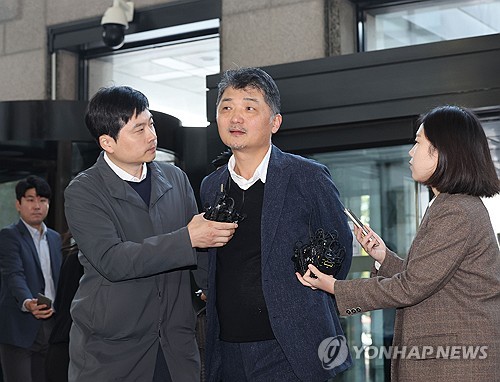 Questioning necessary for Kakao founder for suspected stock rigging: prosecution
Questioning necessary for Kakao founder for suspected stock rigging: prosecution -
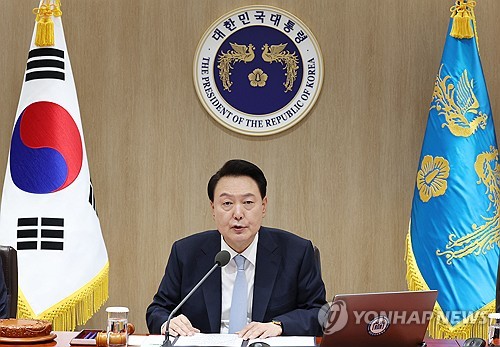 (LEAD) Yoon vows to improve communication with people after election defeat
(LEAD) Yoon vows to improve communication with people after election defeat
-
 S. Korea to provide 100,000 tons of rice to 11 nations
S. Korea to provide 100,000 tons of rice to 11 nations -
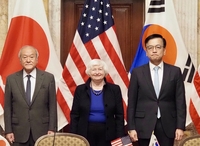 (4th LD) Finance chiefs of S. Korea, U.S., Japan recognize 'serious' concerns over 'sharp' won, yen depreciation
(4th LD) Finance chiefs of S. Korea, U.S., Japan recognize 'serious' concerns over 'sharp' won, yen depreciation -
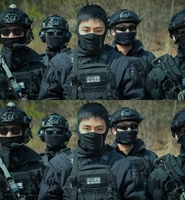 Facebook page unveils photos of BTS member V in counter-terrorism unit gear
Facebook page unveils photos of BTS member V in counter-terrorism unit gear -
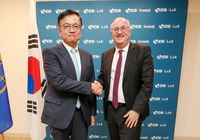 S. Korea to provide US$200 million in humanitarian aid to Ukraine this year
S. Korea to provide US$200 million in humanitarian aid to Ukraine this year -
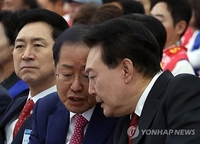 Yoon, Daegu mayor met to discuss post-election matters: sources
Yoon, Daegu mayor met to discuss post-election matters: sources















